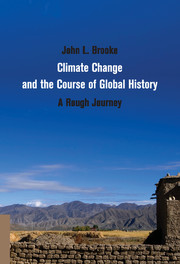Book contents
- Frontmatter
- Dedication
- Contents
- List of Figures and Tables
- Acknowledgments
- List of Abbreviations
- Introduction
- Part I Evolution and Earth Systems
- Part II Domestication, Agriculture, and the Rise of the State
- Part III Ancient and Medieval Agrarian Societies
- Part IV Into the Modern Condition
- 10 Climate, Demography, Economy, and Polity in the Late Medieval–Early Modern World, 1350–1700
- 11 Global Transformations: Atlantic Origins, 1700–1870
- 12 Launching Modern Growth: 1870 to 1945
- 13 Growth beyond Limits: 1945 to Present
- Coda
- Data Bibliography: Full Citations for Data Used in Figures and Tables
- Index
- References
Coda
A Rough Journey into an Uncertain Future
Published online by Cambridge University Press: 05 August 2014
- Frontmatter
- Dedication
- Contents
- List of Figures and Tables
- Acknowledgments
- List of Abbreviations
- Introduction
- Part I Evolution and Earth Systems
- Part II Domestication, Agriculture, and the Rise of the State
- Part III Ancient and Medieval Agrarian Societies
- Part IV Into the Modern Condition
- 10 Climate, Demography, Economy, and Polity in the Late Medieval–Early Modern World, 1350–1700
- 11 Global Transformations: Atlantic Origins, 1700–1870
- 12 Launching Modern Growth: 1870 to 1945
- 13 Growth beyond Limits: 1945 to Present
- Coda
- Data Bibliography: Full Citations for Data Used in Figures and Tables
- Index
- References
Summary
The emergence of the modern economy has made humanity an agent in abrupt climate change and, more broadly, abrupt planetary change. In a flash of either geological or human evolutionary time, human populations have doubled and redoubled to more than 7 billion, twenty-four times the number inhabiting the earth 1,000 years ago; six times the number two centuries ago. In just the past sixty years, human populations have more than doubled, and in a great burst of creative energy and economic and technological transformation, our role in building greenhouse gases has tripled, and we have begun to disrupt the natural systems and services that have sustained us for millions of years. Projections put global population in the year 2100 at 10 billion, long since seen as the outer carrying capacity of the earth. We now stand facing an uncertain future, and hope that our wits, which brought us to a precarious place, will suffice to ensure the sustainability of future generations.
Behind the trajectories that have suddenly launched us out of premodernity lies a tangled paradox of human numbers, prosperity, and earth system stability. On one hand, the evidence of the demographic transition is clear and unequivocal: economic development and a general improvement of human well-being slows population growth by reducing fertility. The decline in fertility that marks the closing of the demographic transition, long completed in the developed world, is advancing significantly in the developing world. But the achieving this goal will require massive resources and energy production – inevitably producing massive quantities of greenhouse gases and further contributing to global warming. The prospect of an irreversible tipping point to a new regime of planetary ecology taking us into a very hostile future lies just over the horizon. Resolving this paradox while we forestall this tipping point, if it can be done, will take all the intellectual, political, and material resources that we can bring to bear.
- Type
- Chapter
- Information
- Climate Change and the Course of Global HistoryA Rough Journey, pp. 559 - 580Publisher: Cambridge University PressPrint publication year: 2014

